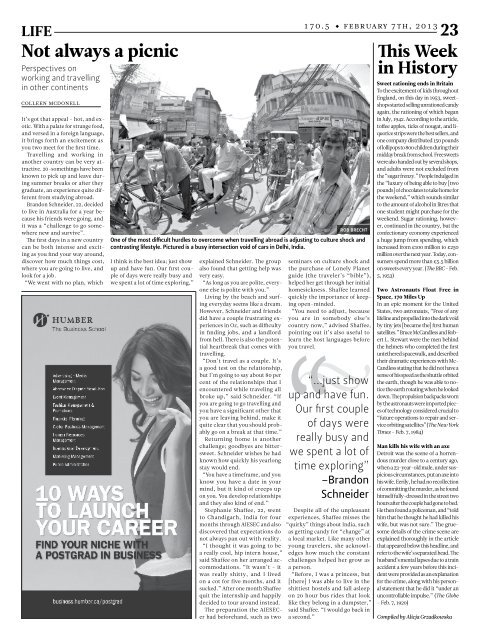You also want an ePaper? Increase the reach of your titles
YUMPU automatically turns print PDFs into web optimized ePapers that Google loves.
170.5 ◆ february 7th, 2013life 23Not always a picnicPerspectives onworking and travellingin other continentsColleen McDonellIt’s got that appeal – hot, and exotic.With a palate for strange food,and versed in a foreign language,it brings forth an excitement asyou two meet for the first time.Travelling and working inanother country can be very attractive.20-somethings have beenknown to pick up and leave duringsummer breaks or after theygraduate, an experience quite differentfrom studying abroad.Brandon Schneider, 22, decidedto live in Australia for a year becausehis friends were going, andit was a “challenge to go somewherenew and survive”.<strong>The</strong> first days in a new countrycan be both intense and excitingas you find your way around,discover how much things cost,where you are going to live, andlook for a job.“We went with no plan, whichI think is the best idea; just showup and have fun. Our first coupleof days were really busy andwe spent a lot of time exploring,”explained Schneider. <strong>The</strong> groupalso found that getting help wasvery easy.“As long as you are polite, everyoneelse is polite with you.”Living by the beach and surfingeveryday seems like a dream.However, Schneider and friendsdid have a couple frustrating experiencesin Oz, such as difficultyin finding jobs, and a landlordfrom hell. <strong>The</strong>re is also the potentialheartbreak that comes withtravelling.“Don’t travel as a couple. It’sa good test on the relationship,but I’m going to say about 80 percent of the relationships that Iencountered while traveling allbroke up,” said Schneider. “Ifyou are going to go travelling andyou have a significant other thatyou are leaving behind, make itquite clear that you should probablygo on a break at that time.”Returning home is anotherchallenge; goodbyes are bittersweet.Schneider wishes he hadknown how quickly his yearlongstay would end.“You have a timeframe, and youknow you have a date in yourmind, but it kind of creeps upon you. You develop relationshipsand they also kind of end.”Stephanie Shaffee, 22, wentto Chandigarh, India for fourmonths through AIESEC and alsodiscovered that expectations donot always pan out with reality.“I thought it was going to bea really cool, hip intern house,”said Shaffee on her arranged accommodations.“It wasn’t – itwas really shitty, and I livedon a cot for five months, and itsucked.” After one month Shaffeequit the internship and happilydecided to tour around instead.<strong>The</strong> preparation the AIESECerhad beforehand, such as twoRob BrechtOne of the most difficult hurdles to overcome when travelling abroad is adjusting to culture shock andcontrasting lifestyle. Pictured is a busy intersection void of cars in Delhi, India.seminars on culture shock andthe purchase of Lonely Planetguide (the traveler’s “bible”),helped her get through her initialhomesickness. Shaffee learnedquickly the importance of keepingopen-minded.“You need to adjust, becauseyou are in somebody else’scountry now,” advised Shaffee,pointing out it’s also useful tolearn the host languages beforeyou travel.“...just showup and have fun.Our first coupleof days werereally busy andwe spent a lot oftime exploring”–BrandonSchneiderDespite all of the unpleasantexperiences, Shaffee misses the“quirky” things about India, suchas getting candy for “change” ata local market. Like many otheryoung travelers, she acknowledgeshow much the constantchallenges helped her grow asa person.“Before, I was a princess, but[there] I was able to live in theshittiest hostels and fall asleepon 20 hour bus rides that looklike they belong in a dumpster,”said Shaffee. “I would go back ina second.”This Weekin HistorySweet rationing ends in BritainTo the excitement of kids throughoutEngland, on this day in 1953, sweetshopsstarted selling unrationed candyagain, the rationing of which beganin July, 1942. According to the article,toffee apples, ticks of nougat, and liquoricestrips were the best sellers, andone company distributed 150 poundsof lollipops to 800 children during theirmidday break from school. Free sweetswere also handed out by several shops,and adults were not excluded fromthe “sugar frenzy.” People indulged inthe “luxury of being able to buy [twopounds] of chocolates to take home forthe weekend,” which sounds similarto the amount of alcohol in litres thatone student might purchase for theweekend. Sugar rationing, however,continued in the country, but theconfectionary economy experienceda huge jump from spending, whichincreased from £100 million to £250million over the next year. Today, consumersspend more than £5.5 billionon sweets every year. (<strong>The</strong> BBC – Feb.5, 1953)Two Astronauts Float Free inSpace, 170 Miles UpIn an epic moment for the UnitedStates, two astronauts, “Free of anylifeline and propelled into the dark voidby tiny jets [became the] first humansatellites.” Bruce McCandless and RobertL. Stewart were the men behindthe helmets who completed the firstuntethered spacewalk, and describedtheir dramatic experiences with Mc-Candless stating that he did not have asense of his speed as the shuttle orbitedthe earth, though he was able to noticethe earth rotating when he lookeddown. <strong>The</strong> propulsion backpacks wornby the astronauts were imported piecesof technology considered crucial to“future operations to repair and serviceorbiting satellites”(<strong>The</strong> New YorkTimes – Feb. 7, 1984)Man kills his wife with an axeDetroit was the scene of a horrendousmurder close to a century ago,when a 23-year-old male, under suspiciouscircumstances, put an axe intohis wife. Eerily, he had no recollectionof committing the murder, as he foundhimself fully-dressed in the street twohours after the couple had gone to bed.He then found a policeman, and “toldhim that he thought he had killed hiswife, but was not sure.” <strong>The</strong> gruesomedetails of the crime scene areexplained thoroughly in the articlethat appeared below this headline, andrefer to the wife’s separated head. <strong>The</strong>husband’s mental lapses due to a trainaccident a few years before this incidentwere provided as an explanationfor the crime, along with his personalstatement that he did it “under anuncontrollable impulse.” (<strong>The</strong> Globe– Feb. 7, 1920)Compiled by Alicja Grzadkowska





